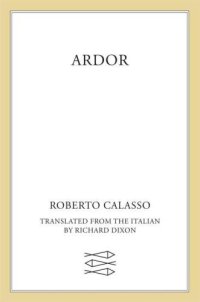
Ebook: Ardor
Author: Roberto Calasso, Richard Dixon (transl.)
In this revelatory volume, Roberto Calasso, whom the Paris Review has called 'a literary institution', explores the ancient texts known as the Vedas. Little is known about the Vedic people who lived more than three thousand years ago in northern India: they left behind almost no objects, images, ruins. They created no empires. Even the hallucinogenic plant, the soma, which appears at the centre of some of their rituals, has not been identified with any certainty. Only a 'Parthenon of words' remains: verses and formulations suggesting a daring understanding of life.
'If the Vedic people had been asked why they did not build cities,' writes Calasso, 'they could have replied: we did not seek power, but rapture.' This is the ardor of the Vedic world, a burning intensity that is always present, both in the mind and in the cosmos. With his signature erudition and profound sense of the past, Calasso explores the enigmatic web of ritual and myth that define the Vedas. Often at odds with modern thought, he shows how these texts illuminate the nature of consciousness more than neuroscientists have been able to offer us up to now. Following the 'hundred paths' of the Satapatha Brahmana, an impressive exegesis of Vedic ritual, Ardor indicates that it may be possible to reach what is closest by passing through that which is most remote, as 'the whole of Vedic India was an attempt to think further'.
Roberto Calasso is the author of many books, among which a work in progress, where Ardor is the seventh part, after The Ruin of Kasch, The Marriage of Cadmus and Harmony, Ka, K., Tiepolo Pink and La Folie Baudelaire.
In this revelatory volume, Roberto Calasso, whom the Paris Review has called 'a literary institution', explores the ancient texts known as the Vedas. Little is known about the Vedic people who lived more than three thousand years ago in northern India: they left behind almost no objects, images, ruins. They created no empires. Even the hallucinogenic plant, the soma, which appears at the centre of some of their rituals, has not been identified with any certainty. Only a 'Parthenon of words' remains: verses and formulations suggesting a daring understanding of life. 'If the Vedic people had been asked why they did not build cities,' writes Calasso, 'they could have replied: we did not seek power, but rapture.' This is the ardor of the Vedic world, a burning intensity that is always present, both in the mind and in the cosmos. With his signature erudition and profound sense of the past, Calasso explores the enigmatic web of ritual and myth that define the Vedas. Often at odds with modern thought, he shows how these texts illuminate the nature of consciousness more than neuroscientists have been able to offer us up to now. Following the 'hundred paths' of the Satapatha Brahmana, an impressive exegesis of Vedic ritual, Ardor indicates that it may be possible to reach what is closest by passing through that which is most remote, as 'the whole of Vedic India was an attempt to think further'.
In this revelatory volume, Roberto Calasso, whom the Paris Review has called 'a literary institution', explores the ancient texts known as the Vedas. Little is known about the Vedic people who lived more than three thousand years ago in northern India: they left behind almost no objects, images, ruins. They created no empires. Even the hallucinogenic plant, the soma, which appears at the centre of some of their rituals, has not been identified with any certainty. Only a 'Parthenon of words' remains: verses and formulations suggesting a daring understanding of life. 'If the Vedic people had been asked why they did not build cities,' writes Calasso, 'they could have replied: we did not seek power, but rapture.' This is the ardor of the Vedic world, a burning intensity that is always present, both in the mind and in the cosmos. With his signature erudition and profound sense of the past, Calasso explores the enigmatic web of ritual and myth that define the Vedas. Often at odds with modern thought, he shows how these texts illuminate the nature of consciousness more than neuroscientists have been able to offer us up to now. Following the 'hundred paths' of the Satapatha Brahmana, an impressive exegesis of Vedic ritual, Ardor indicates that it may be possible to reach what is closest by passing through that which is most remote, as 'the whole of Vedic India was an attempt to think further'.
Download the book Ardor for free or read online
Continue reading on any device:

Last viewed books
Related books
{related-news}
Comments (0)